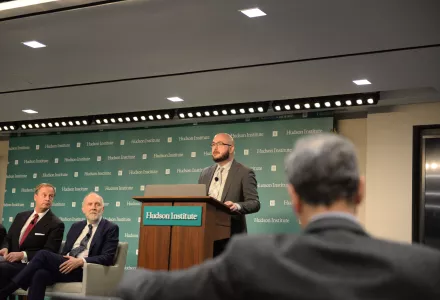
International efforts to prevent nuclear terrorism have entered a new era of uncertainty. Terrorist threats are evolving, and it is increasingly unclear if nuclear security protections against them will keep pace. If improvements to nuclear security do not adapt to these threats, the risk of nuclear terrorism will grow.
Revitalizing Nuclear Security in an Era of Uncertainty, a new report from the Project on Managing the Atom (MTA), highlights this alarming reality and outlines steps the global community must take to improve security for weapons-usable nuclear material.
“Nuclear security around the world has improved dramatically over the last three decades—which demonstrates that with focused leadership, major progress is possible,” the report states. “But important weaknesses remain, and the evolution of the threat remains unpredictable. The danger that terrorists could get and use a nuclear bomb, or sabotage a major nuclear facility, or spread dangerous radioactive material in a ‘dirty bomb,’ remains too high.”
The authors—Managing the Atom’s Professor of Practice Matthew Bunn, Senior Research Associate Nickolas Roth, and Senior Fellow William H. Tobey—presented their findings and recommendations at a Hudson Institute event in Washington, D.C. on January 29.
Writing in The Hill, the authors urged 2020 presidential candidates to develop a plan for reducing nuclear terrorism risks and offered a reminder that the issue should transcend partisan politics. “Every president for more than two decades, including Donald Trump, has described nuclear terrorism as one of the gravest dangers the United States faces,” they write.
The report is the latest in a long-standing series on nuclear security from MTA, and the first since the 2016 Nuclear Security Summit. In that time, countries have continued to take measurable steps to improve nuclear security, from requiring protections against cyber attacks to launching programs to strengthen security culture in nuclear organizations. But momentum is slowing, the report notes.
“High-level political attention to nuclear security and overcoming obstacles has largely faded, international mechanisms for fostering nuclear security action and cooperation have not managed to fill the gap created by the absence of nuclear security summits, and political disputes continue to impede efforts to sustain or expand cooperation in crucial areas,” the report says.
The authors recommend action to regain the momentum in four key areas: combating complacency; strengthening nuclear security implementation on the ground; bolstering frameworks for international nuclear security cooperation; and sustaining nuclear security leadership.
MTA has released two policy briefs summarizing major aspects of the report, and more will be released in the coming months. Bunn, Roth, and Tobey also continue to discuss the report’s findings and recommendations with government officials.
Read the full report here.
Carozza, Jacob. "Blueprints for Tackling 2019 Challenges: A Vision for Nuclear Security." Belfer Center Newsletter. Belfer Center for Science and International Affairs, Harvard Kennedy School (Spring 2019).
